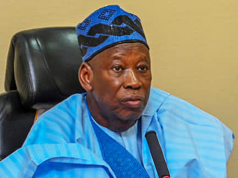Can the Nigerian government pay the N494,000 the Labour unions are asking for as minimum wage? If we are being honest, the answer is no. Should the Labour Congress accept the N60,000 being offered? No, not at all. So, what then should be the middle ground? Come with me as we explore what history recommends.
The history of wage reviews goes back as early as 1959 in Nigeria, but this report will start from 1972. After the oil boom of the early 1970s, General Yakubu Gowon called on Jerome Udoji, an experienced public servant and consultant, to lead a commission for the review of workers’ salaries in the public sector. His work led to what famously became the “Udoji Award,” which gave a bump to salaries across the country.
By 1979, when Shehu Shagari took over as a Democratic President, his government implemented a bump in the pay for politicians in public office. Unfortunately for the Shagari government, the National Labour Congress (NLC) was set up a year earlier — 1978. So the gusto was there for the union to request a global minimum wage. At the time, NLC asked for N300 per month as minimum wage. After the now-familiar battle with the federal government, the minimum wage bill of 1981 was signed into law at a compromise of N150 ($245) per month.
In this instance, NLC wanted N300 but the conversations ended at 50% less than what was demanded.
ABDULSALAMI ABUBAKAR’S MINIMUM WAGE
After Shagari, Nigeria went into a number of military coups, where such demands for wage review were a lot more difficult. For instance, the Vision 2010 committee asked General Sani Abacha to pay a minimum wage of N20,000 from about N250 as it had become in the early 1990s.
However, by the time Abdulsalami Abubakar became the transition head of state in 1998, the minimum wage for federal workers had become N450, and his government announced a review in the minimum wage from N450 ($5) to N5,280 ($60). This was a 12-fold increase in wages. At this time, there has now a disparity in payment for federal workers and state employees.
Sadly, the economic situation in the country became dire, and this government could not keep up with its new minimum wage announced, causing the government to backtrack and bring wages from N5,280 to N3,500 ($35).
In this instance, the 1,100% jump in salaries was not sustainable, hence the government settled for a 600% bump, which were also difficult to pay.
OBASANJO’S REFORMS & WAGE BUMP
So when Olusegun Obasanjo came into power in 1999, many civil servants, by law, were earning just a little above the minimum wage of 1981. NLC, under the leadership of Adams Oshiomhole, comrade-turned-governor and senator, emphasised the need for a review. So in 2000, the government reviewed pay and passed a new minimum wage bill to give workers N5,500 ($55) from the N250 ($2.5).
This was a democracy and the new wages had become a law that the government and employers must follow. Many states struggled, but this became the norm. This was a 2,100% bump in pay from the late 80s, but the times and the currency devaluation also meant a drastic drop from $245 in 1981 to $55 in 2000.
Obasanjo’s Wage Act also had provisions for steady salary increases within the following years. The consequence of Obasanjo’s decision was drastic inflation. The inflation rate within the following year after the salary bump was over 23% — from negative territory. His government spent the next couple of years battling inflation.
It took five years for Obasanjo to bring inflation back to single digits.
JONATHAN, BUHARI YEARS
By 2010, at about the time Goodluck Jonathan became president, the national minimum wage had become about N7,500 ($50). The labour unions were now asking for a little over N52,000 — nearly a 600% increase. Learning from the inability of the Abudulsalami government and the inflation battle of the Obasanjo era, the Jonathan government could not accommodate a 600% increase.
Instead, his government increased it to N18,000 in March 2011. This meant a 140% increase in salaries. This was fine for another five years till Muhammadu Buhari took office in 2015. The agitations began.
In 2016, the NLC made a formal request to review the minimum wage from N18,000 to N56,000 — representing a 211% increase. Former president Buhari was able to hold NLC off for another few years until his second term in 2019. Against what was requested, the Buhari government and the NLC settled for a review from N18,000 to N30,000 — 66.67% increase.
The Minimum Wage Act signed by Buhari stipulated that wages be reviewed after five years, which has brought us to where we are in 2024.
WHAT IS A FAIR COMPROMISE FOR FG AND LABOUR?
The NLC, after starting the conversations around N1,000,000 have come to request N494,000 as the new minimum wage in 2024, from the current N30,000. The government has said it is willing to pay above N60,000, without stating how much more. A jump from N30,000 to N494,000 is a 1,545% increase, which has never happened within a five-year period in the country.
Understandably, fuel prices, exchange rates and other economic indicators have entered record-breaking territories. Fuel prices have jumped by at least 250%, exchange rate by about 222%, and inflation is up 33%. All this makes it difficult to ask the labour unions to take just a 100% pay bump.
However, in the eleven years between 2000 to 2011, the minimum wage went up by 227%. Regardless of the drastic economic changes from 2011 to 2019 — an 8-year period — the country only managed a 67% increase. Going by these indices, minimum wage change over a five-year period could be anything between 20% per year (from Obasanjo to Jonathan) or 8.4% per year (from Jonathan to Buhari).
Under Shagari, NLC got half of what they wanted, under Jonathan, they got about a third of what was requested, under Buhari, they got a little over half of their request. History teaches no clear pattern exists, no two regimes have proven to be the same, and the biggest bump since the country had a unified minimum wage has been 140%.
A 140% bump will bring today’s minimum wage to N72,000. Is this a fair place for NLC to call it a day?







